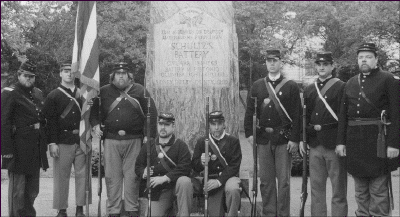|
MEMORIAL DAY CEREMONIES 1998

Troops of the 94th O.V.I. Civil War re-enactment group led by Captain Doug Slagel (below at left)
joined the Society to honor
Shelby County, Ohio soldiers lost in war.
Memorial Day, originally called Decoration Day, is a day to remember those who have died in our nation’s service. After the Civil War, many in the North and South decorated graves of fallen soldiers with flowers. Decoration Day was officially proclaimed on May 5, 1868, by General John Logan in General Order No. 11, and first observed on May 30, 1868. Gen. Logan’s order, read each year at Memorial Day services in Sidney, appears below. In 1882, the name was changed to Memorial Day, and soldiers who had died in other wars were also honored. In 1971, Memorial Day was declared a national holiday to be held on the last Monday in May.
General John Logan’s 1868 "memorial order" inaugurated an "observance with the hope it will be kept up from year to year, while a survivor of the war remains..." The "observance" has survived all Civil War veterans to become a day for honoring the memory of the fallen heroes of all our nation’s wars. This general order is read each year during Memorial Day ceremonies in Sidney.
Headquarters, Grand Army of the Republic
General Order No. 11
Washington, D.C., May 5, 1868
I. The 30th day of May, 1868, is designated for the purpose of strewing flowers or otherwise decorating the graves of comrades who died in defense of their country during the late rebellion, and whose bodies now lie in almost every city, village, and hamlet churchyard in the land. In this observance no form or ceremony is prescribed, but posts and comrades will in their own way arrange such fitting services and testimonials of respect as circumstances may permit.
We are organized, comrades,
as our regulations tell us, for the purpose, among other things, "of preserving and
strengthening those kind and fraternal feelings which have bound together the soldiers,
sailors, and marines who united to suppress the late rebellion." What can aid more to
assure this result than by cherishing tenderly the memory of our heroic dead, who made
their breasts a barricade between our country and its foe? Their soldier lives were the
reveille of freedom to a race in chains, and their death a tattoo of rebellious tyranny in
arms. We should guard their graves with sacred vigilance. All that the consecrated wealth
and taste of the Nation can add to their adornment and security is but a fitting tribute
to the memory of her slain defenders. Let no wanton foot tread rudely on such hallowed
grounds. Let pleasant paths invite the coming and going of reverent visitors and fond
mourners. Let no vandalism of avarice or neglect, no ravages of time, testify to the
present or to the coming generations that we have forgotten, as a people, the cost of free
and undivided republic.
If other eyes grow dull and other hands slack, and other hearts
cold in the solemn trust, ours shall keep it well as long as the light and warmth of life
remain in us.
Let us, then at the time appointed, gather around their sacred remains and garland the
passionless mounds above them with choicest flowers of springtime; let us raise above them
the dear old flag they saved from dishonor; let us in this solemn presence renew our
pledges to aid and assist those whom they have left among us as sacred charges upon the
nation’s gratitude, —the soldier’s and sailor’s widow and orphan.
II. It is the purpose of the Commander-in-Chief to inaugurate this observance with the
hope it will be kept up from year to year, while a survivor of the war remains to honor
the memory of his departed comrades. He earnestly desires the public press to call
attention to this Order, and lend its friendly aid in bringing it to the notice of
comrades in all parts of the country in time for simultaneous compliance therewith.
III. Department commanders will use every effort to make this order effective.
By command of: John A. Logan, Commander-in-Chief N.P. Chipman,
Adjutant-General
[ Back to Events Index ]
|

